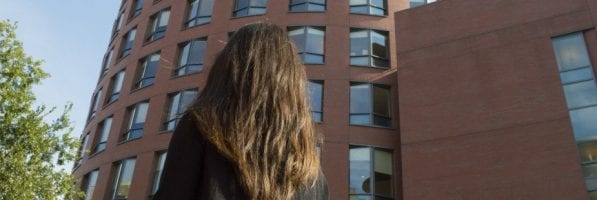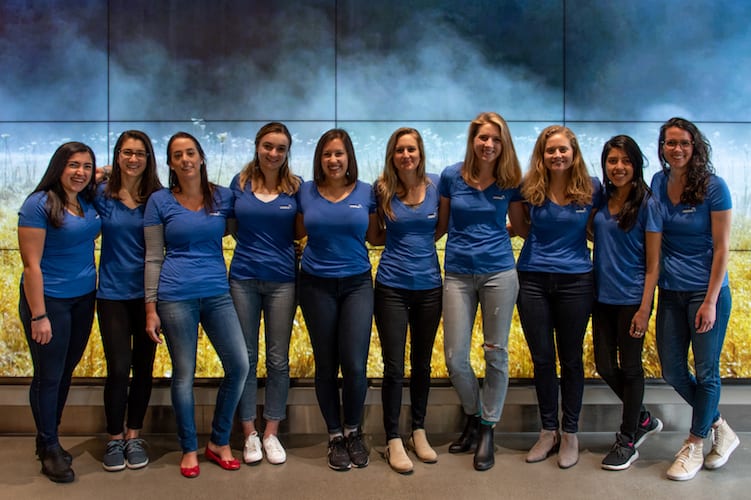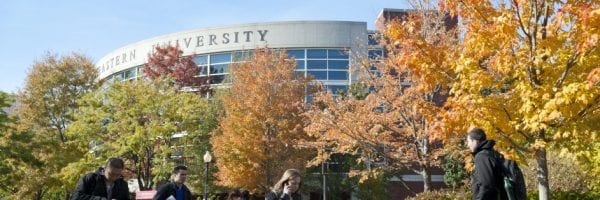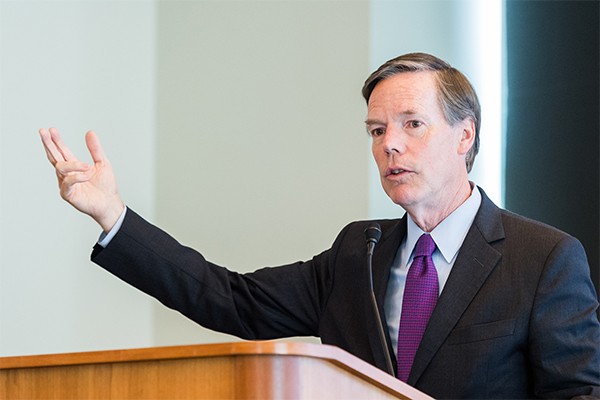Friday News Roundup – Wharton Opens FinTech Center, Northeastern Students Give Back, and More

Let’s take a look at some of the biggest stories from this week, including the all new Wharton FinTech Center.
Giving Day at D’Amore-McKim – Northeastern University News
On April 11, 2019, Northeastern University will host its Annual Giving Day: a 24 hour event that will support, among other NU endeavors, expansion of D’Amore-McKim‘s programs.
“Giving Day is a great way of getting our entire D’Amore-McKim community to come together to support what makes us remarkable,” Deborah Magnezy, Assistant Dean of Development at D’Amore-McKim, says of the event.
Among the funds to which donors can contribute are a FinTech Initiative, which engages students with the latest in technological advances within the financial services community; the Entrepreneurship and Innovation Fund, which will help create co-ops for students in this field; a Global Learning Fund, and the Digital, Analytics, Technology, and Automation (DATA) Initiative Fund.
Giving Day will feature speakers and activities for alumni, students, faculty and all others who support the school. To learn more about Giving Day, click here.
Wharton Announces Stevens Center for Innovation in Finance – Wharton News
University of Pennsylvania’s Wharton School of Business announced the establishment of the Stevens Center for Innovation in Finance in order to focus on tech innovation across the industry.
Named for Ross Stevens, alum and founder of Stone Ridge Holdings Group, the center will hold its inaugural event on April 3. FinTech leaders such as Wharton alum Jackie Reses, head of Square Capital, and David Klein, CEO of CommonBond, will appear at the event. The Stevens Center will be led by David Musto, Ronald O. Perelman Professor in Finance at Wharton.
According to Penn president Amy Gutmann, “The mission of the Stevens Center is precisely this: to ensure that innovations in finance make the greatest positive contributions to businesses and communities across the globe. The Stevens Center will catalyze Penn’s world-leading research and industry engagement and enrich the opportunities available for our outstanding students.”
The center will welcome business leaders to campus, and will offer students curriculum in FinTech research. It will also offer engagement with Wharton’s various FinTech clubs to open new career pathways for interested students. Along with courses, the center will offer mentorship opportunities and research projects, which will translate into real world applications.
You can learn more about the new Wharton FinTech Stevens Center here.
Gies Students Honored for Southside Startup – Gies College of Business News
Jordan Buckner and Isaac Lozano, two University of Illinois Gies College of Business MBAs, have brought their b-school knowledge to bear in the formation of their Chicago company Tea Squares, and have also created great social impact within the South Side community.
Tea Squares, which are snacks infused with energy enhancing teas, are selling in hundreds of retail stores, including Whole Foods, Jewel, and Mariano’s. In addition, the company’s success has earned the partners acknowledgement by Forbes for its annual 30 Under 30 list. Buckner says of the Forbes mention, “It was awesome to be recognized for creating a great-tasting snack to help people achieve success during their day and also be recognized for our social mission, which is a critical piece [of our business plan]… it was very humbling to be honored in that way.”

TeaSquares founders and Gies alumni Jordan Buckner, left, and Isaac Lozano, seen in their recent Chicago Tribune feature.
Tea Squares offers fellowships via partnerships with community revitalization groups. Through this, Buckner and Lozano find candidates with high-potential for sales, marketing, or production roles. The end goal of the fellowship is to train candidates to pursue their own ventures, thus strengthening the economy of the South Side.
For more on Buckner, Lozano, and Tea Squares, click here.
Stern Announces Major Research on Sustainable Products Market – NYU Stern School of Business News
The Center for Sustainable Business at NYU’s Stern School of Business recently released new findings from its Sustainable Share Index, an analysis of consumer’s purchases of products and business marketed as sustainable.
Over half of the growth in sales of consumer packaged goods since 2013 has been comprised of products with ‘environmentally friendly’ attributes. These items comprised 16.6 percent of consumer sales in 2018. Over the five year period, sustainability-marketed products had an increase in sales of 29 percent, or $114 billion. This may grow to $140 billion by 2024.
NYU Stern professor and founding director of Stern’s Center for Sustainable Business Tensie Whalen says:
“Results from this research reinforce the idea that embracing sustainability leads to better business results. We are excited to launch the Sustainable Share Index and look forward to continuing our research in the years to come.”
Other experts on sustainable business were quick to remark on this “eye opening” study. “Companies should take notice—the benefits of sustainability cannot be ignored … In fact, this groundbreaking research shows the significant impact that sustainable products have on overall category growth.” notes Randi Kronthal-Sacco, senior scholar in Marketing and Corporate Outreach from the Stern’s Sustainable Business Center.
For more on the Sustainable Share Index and the recent research, click here.
Berkeley Haas Hosts 23rd Annual Women in Leadership Conference – Berkeley Haas News
The University of California’s Berkeley Haas School of Business‘ Women in Leadership Conference takes place this weekend, March 16, 2019.
A team comprised of Berkeley Haas MBAs has worked for months to produce the 23rd annual event, which is the school’s longest running conference. With over 300 attendees expected to attend and 20 speakers on various issues affecting women across the world, WIL’s 2019 theme will be “Your Stories, Your Growth”.
Dean Ann Harrison will open the event with a welcome address. A keynote speech, panel discussions, and breakout sessions are to follow. Erin Casale, MBA 19 and WIL conference team member says of this year’s theme, “Stories inspire change, and that’s our ultimate collective goal … We recognize that everyone attending this conference brings something to the table.”

Members of the 2019 Women in Leadership Conference at the UC Berkeley Haas School of Business / Photo via http://newsroom.haas.berkeley.edu
Other speakers will be Sandra Lopez, VP at Intel Sports; Tyi McRay, interim director of diversity at Airbnb; Elena Gomez, CFO of Zendesk, and Brandi Pearce, lecturer in the Management of Organizations at Berkeley Haas.
Casale notes that the goal for the conference is to plant the seeds for change for those who attend.
“For us, it will be a win if attendees come away with a clear next step of what they can do to set themselves and their peers on a better path toward equity and inclusion … We want people to feel equipped for change and inspired to start it.”
Click here for more on this year’s conference.
Northeastern’s New MBA Offering, and More – Boston News

Let’s explore some of the most interesting stories that have emerged from Boston business schools this week.
When Your Moon Shots Don’t Take Off – Harvard Business Review
Many scholars seek to understand how we can move away from incremental thinking to what Google calls “10x thinking”—ideas that lead to “10-fold improvements rather than the more typical 10 percent ones.”
In a recent edition of Harvard Business Review, INSEAD Assistant Professor of Strategy Nathan Furr and Brigham Young’s Jeffrey H. Dyer say the real limit to “10x” ideas are biases that distort our perceptions and prevent us from seeing possibilities.
The duo present tactics and tools to challenge our instincts to avoid risk and choose the path of least resistance with the ultimate goal of breaking through to the realm of innovative possibilities.
Furr and Beesley describe how cell phones, earbuds, credit cards, self-driving cars, and atomic power were all inspired by science fiction. “Science fiction can provide a kind of rigorous optimism. There’s no magic; science fiction just provides the inspiration and then you make a rigorous plan and go for it.”
You can read more about the research over at HBR.
New MBA x Computer Science Degree Addresses Market Demand for Tech-Savvy Leaders – D’Amore-McKim School of Business News
“Breakthrough technologies, robotics, artificial intelligence, the Internet of Things, and blockchain promise higher productivity, enhanced efficiencies, and economic growth,” says Raj Echambadi, Dunton Family Dean at Northeastern University D’Amore-McKim School of Business.
Future business leaders need leadership frameworks but also hard technical skills to have a deeper understanding of how technology will impact the future of business. To meet this growing demand, D’Amore-McKim now offers a new full-time MBA degree concept: MBA x Computer Science.
On the new concentration at Northeastern/D’Amore-McKim, the school writes, “Students in the MBA x Computer Science track will choose one concentration in business and one concentration in computer science thanks to a partnership with Northeastern’s Khoury College of Computer and Information Sciences, and they will also complete a corporate residency–a distinctive component of the Northeastern MBA program that is the hallmark of graduate experiential learning.”
“Business and technology are now intertwined, and to master a skill set in both areas will set our students apart and set them up for success,” says D’Amore-McKim Associate Dean of Graduate Programs Kate Klepper.
Dean Echambadi explains:
“These technologies are changing the way we live, learn, produce, and consume content, as well as how employees and enterprises work across all industries. Advanced business education is a critical component in helping people and industries navigate challenges with digital convergence and turn them into opportunities.”
Read the full D’Amore-McKim School of Business News article here.
Social Media Advertising Can Boost Fake News—Or Beat It – MIT Sloan Ideas Made to Matter
According to new research from MIT Sloan Economist Catherine Tucker and Occidental College’s Lesley Chiou, Ph.D. ’05, restricting or redirecting advertising on social media could be part of a solution to the problem of fake news.
After Facebook released a new advertising system that blocks ads from pages that repeatedly share fake news, researchers found a 75 percent reduction in the amount of fake news being shared on the platform.
Tucker and Chiou caution that the solution is far more complex than just advertising, however.
“The actions of platforms such as Facebook in regulating advertising do seem to have had an effect on the volume of fake news. However, our paper also emphasizes that in just focusing on ads and fake news, we are missing the bigger picture, which is the organic spread of misinformation by users themselves,” Tucker says in a recent interview wit MIT.
“The popularity of fake news may occur in the absence of advertising, as users share articles with others in their social network, but working to stamp out misinformation in those posts runs into its own set of problems,” Tucker adds.
“Trying to regulate that seems to get us into very problematic First Amendment territory.”
You can read more about Tucker and Chiou’s research here.
Finding The Best Affordable Full-Time MBA Programs

Earning an MBA is a great way to ensure some level of financial security in the future. However, if earning the degree leaves you with mountains of debt, that security can start to seem like a pipe dream. Fortunately, there are business schools that provide some of the best affordable full-time MBA programs in the country.
Analyzing the full-time MBA rankings from U.S. News & World Report, we outline ten of the best MBA programs throughout the country that don’t come with the hefty price tag. Check out the ten programs that cost less than $25,000 per semester below.
The Best Affordable Full-Time MBA Programs

The D’Amore-McKim School of Business at Northeastern University charges $1,600 per credit for their 55-credit program. The cost comes to about $22,000 per semester, which is not bad considering the average starting salary for recent grads is $88,000. The Boston school also offers its students a corporate residency while pursuing their degree, which helps alleviate financial pressure. The average salary for the Corporate Residencies was a respectable $32.52 per hour in 2018. Moreover, 91 percent of MBAs receive job offers within three months of graduation. Students with an interest in international business can participate in the Global Consulting Project or International Field Study.

At $11,855 per semester, going to La Salle University allows students to earn their MBAs without breaking the bank. The length of the program varies depending on a student’s previous credits and scheduling choices. Students who majored or minored in business can complete their degree in 12 months, whereas students without a business major or minor may take up to 24 months. Options for specialization include: accounting, business systems and analytics, finance, general business administration, management, and marketing.
Despite the reasonable price tag, La Salle grads have gone on to work high-level positions at well-known companies like Deloitte LLP and Morgan Chase.

The University of Colorado, Boulder Leeds School of Business ranks 65th overall among the best full-time MBA programs on U.S. News, and has a welcoming price tag to back it up. For in-state residents, the program is only $900 per credit ($1,200 for out-of-state residents). Over the course of 55 credits, this comes to just $49,500 for in-state residents over the entire two years of the program: $24,750 per year.
Leeds emphasizes entrepreneurship and a global outlook. The degree electives encourage students to concentrate on finance, marketing, management, or systems-operations. Students can complement this “functional focus” with a more tailored specialization like entrepreneurship, real estate, or sustainability. MBAs are not limited to MBA courses, as the program allows them to take up to four electives in other schools at CU Boulder. Additionally, students earning their MBA in Sustainability have the opportunity to take courses in University of Colorado’s Environmental Studies, Engineering, and Law Schools.

Upstate New Yorkers will be pleased to learn that the Binghamton University School of Management costs about $17,205 (with fees) per year for in-state residents. Non-residents pay about $26,745 (with fees) per year. Binghamton also does not require that entering MBAs have a business background, though they recommend a rudimentary knowledge of calculus, as well as strong skills in English and IT. The standard four-semester MBA is open to students from all undergrad majors. The school is currently 76th on the U.S. News list. Binghamton, NY may also be a strategic career-launch location, as the city made the Forbes list of “The Best Small Places For Business And Careers.”

Internships and opportunities to hobnob abound in the U.S. capital, making DC an excellent place to earn an MBA. However, with the cost of living on the rise, finding a relatively affordable school is key to maximizing return on investment. The cost of pursuing an MBA at the Kogod School of Business at American University comes out to about $20,923 per semester, for a total cost of $83,692. And, with a mean graduate salary of $84,725, it should not take grads long to see a respectable ROI. Kogod offers features like weekly Business Leadership Luncheons, wherein local business pioneers share their experiences and insights with students. Speakers have included senior executives from PayPal, IBM, and Marriott International. Graduates of the program have gone on to work at companies like Amazon, Deloitte, and Ford Motor Company.
YOU MAY ALSO LIKE: The Five Most Valuable Online MBAs

MBAs at the Argryros School of Business—the 79th overall school on the U.S. News list—pay $1,655 per credit. Which, for the 50-credit program, averages to about $20,687 per semester. The Orange County, CA school offers tracks in accounting, business analytics, entertainment and media management, entrepreneurship, finance, global business, marketing, and strategic management. The school also offers a variety of dual degrees, including an MBA/MFA in Film & TV Producing.

The University of San Diego School of Business Administration MBA currently costs $1,420 per credit. With a 56-credit requirement for the two-year program, the cost without fees comes to around $19,880 per semester. It is tied with the aforementioned Argyros School of Business at 79th overall on the U.S. News list of the country’s best business schools.
USD’s curriculum is based on four pillars: Leadership development; business function core; corporate social responsibility, sustainability, and ethics; integrative problem solving. For students with a global mindset, the International MBA has the same cost per credit, but requires only 44 credits.

In addition to being affordable, the Lerner College of Business is located in Delaware, where tax-free shopping makes the cost of living far less daunting. The Lerner MBA costs just $825 per credit for Delaware residents, and $1,000 per credit for those from out of state. This puts total cost per semester in a range from $9,075-$11,000.
Lerner MBAs can choose from a variety of concentrations, including (but not limited to): business analytics, international business, and sport management. Students can pursue a full-time, part-time, online, or hybrid MBA. Pursuing a hybrid of online and on-campus courses may also be fiscally helpful, since online credits tend to be more cost-effective.

The CSU College of Business offers several options for students pursuing an MBA. The school has a nationally renowned online MBA program, and also offers a Global Social and Sustainable Enterprise MBA, an Executive MBA, and an Evening MBA.
According to U.S. News, tuition for the full-time program is $757 per credit for in-state students and $1,557 per credit for out-of-state students. Given the huge cost cut for Colorado natives, CSU may be a prudent choice for residents of the state.

Students who are NYC-bound might consider applying to the Pace University Lubin School of Business. The total cost of an MBA education at Lubin education can vary, as different tracks require a different number of credits. However, at $1,267 per credit, the cost can be very manageable, particularly considering its prime spot in downtown Manhattan and all of the internship and job opportunities this location presents. Particularly for those with a bent toward accounting or finance, Lubin may be the perfect launching pad for a career in the big city. A substantial 92 percent of recent grads found jobs upon graduating.
DMSB Keynote Speaker Encourages MBAs, New Startups, and More – Boston News

Let’s explore some of the most interesting stories that have emerged from Boston business schools this week.
Life is Like a Venture Investment, Biotech Entrepreneur Tells Business Graduates – D’Amore-McKim Blog
The Northeastern University D’Amore-McKim School of Business selected biotech entrepreneur Dr. Gerald Chan as the keynote speaker at the DMSB graduation ceremony last month.
Dr. Chan, whose private investment firm Morningside Group funds “life sciences startups that are working to discover new ways to treat disease,” implored the assembled crowd at Matthews Arena to “live a life that makes themselves and their loved ones proud” even if “life can be at times so scary and at other times so exhilarating.”
Dr. Chan shared a personal anecdote about his father’s refusal to accept a job at casino on ethical grounds: “Had he accepted that offer, our family would have become financially richer. But because he acted on his ethical principles against his own economic interest, my family can stand tall today.”

D’Amore-McKim School of Business graduates, during last month’s ceremony / Photo via damore-mckim.northeastern.edu
You can read the full article here for a complete overview of the ceremony.
Winning Paper Shows Network Effects Fuel Business Value and Upend Strategy – Questrom School of Business Blog
BU Questrom School of Business‘ Marshall Van Alstyne recently co-authored new research that finds that “platform businesses” that depend on high numbers of users like Microsoft, Apple, Uber, Google, and Amazon scale much faster by moving value creation from “internal production to external orchestration.”
In “Platform Ecosystems: How Developers Invert the Firm,” Van Alstyne and his co-authors conclude that this approach will reverberate through “every part of a business, from marketing to operations to human resources.”
“Instead of a firm doing all its own marketing, consumers can add value through viral marketing. Instead of AirBnB incurring operating costs of a hotel stay, ecosystem partners bear those costs.”
“Instead of hiring employees inside the firm, platforms rely on freelancers outside the firm. In each of these instances, the value-creating activity shifts from inside to outside the firm. This shift affects all of the traditional business functions. It also has profound implications for fair division of wealth in society.”
You can read the full article here and the complete paper here.
25 MIT Startups To Watch – MIT Sloan Newsroom
On Saturday, September 8, Bill Aulet, Managing Director of the Martin Trust Center for MIT Entrepreneurship told the crowd at the MIT Kresge Auditorium, “We’re not just going to be doing another dating app.”
“We’re going to be doing things like addressing inclusion in society, making a more informed citizen throughout the world, cybersecurity, mental health, urbanization, improving ed-tech, improving health care. These are significant problems that the brightest people in the world should be working on, and those people are MIT students.”
The ambitions Aulet spoke about were created from the 25 startups built within the MIT delta v accelerator, which you can check out here.
MIT Announces 9 African Startup Challenge Finalists, and More – Boston News

Let’s explore some of the most interesting stories that have emerged from Boston business schools this week.
These 9 African Startups are Working Toward a More Inclusive World – MIT Sloan Newsroom
MIT Sloan recently announced the nine African startup finalists of The Initiative on the Digital Economy’s Inclusive Innovation Challenge, all of which use technology to “reinvent the future of work.”
Initiative Director Erik Brynjolfsson writes, “If we employ inclusive innovation globally, it could be the best thing that ever happened to humanity. We can have more wealth, better health, and widely held prosperity.”
Here are the 9 African finalists:
- Wefarm provides a “mobile network accessed through SMS, where millions of small-scale farmers can share information.”
- PrepClass connects students and tutors.
- Wesabi connects “skilled laborers to individuals and businesses.”
- Lynk is an “online platform that operates as a hiring service and also a showcase for artisans.”
- Brave Venture Labs provides “talent sourcing software for growing companies.”
- Moringa School “teaches software development and offers professional skills training.”
- Safi Organics “provides small-scale farmers with affordable fertilizer for their crops.”
- Solar Freeze “offers mobile cold-storage units for small farmers to help reduce crop spoilage.”
- AgroCenta is a “digital platform for rural, small-scale farmers to connect with buyers and access financial services.”
The finalists, who will travel to Nairobi, Kenya in late August to “pitch their ideas at a regional competition,” were selected from almost 200 entrepreneurs from 16 countries.
You can read more about the African startup contenders here.
Collaborate, But Only Intermittently, According to New Study by Harvard Business School Professor and Colleagues – Harvard Business School News
HBS has published new PNAS research, which suggests that always-on technologies like Slack, email, and social media are less effective at complex problem solving than “intermittently on.”
HBS’s Ethan Bernstein, along with BU Questrom’s Jesse Shore, and Northeastern’s David Lazer believe their research could have widespread implications on the workplace, such as “alternating independent efforts with group work over a period of time to get optimal benefits.”
Bernstein writes, “As we replace those sorts of intermittent cycles with always-on technologies, we might be diminishing our capacity to solve problems well.”
You can read more about the research here.
Sizing up Markets, Peering into the Future – Carroll School News
BC Carroll recently hosted its annual Finance Conference in which financial experts delivered a surprisingly “upbeat forecast” on global investment, tech innovations, and cryptocurrencies.
Of the conference’s goals, John and Linda Powers Family Dean Andy Boynton ’78 writes, “We want our students to become lifelong learners, people who look for ideas in many different places. We want them to think both deeply and broadly, and to become great leaders for the future.”
Despite the relative stasis of the larger economy, Harvard’s Kennedy School of Government Professor Nicholas Burns ’78 described this particular moment in American history “consequential” and “chaotic” from a global economy standpoint.
Burns explains that “high on his list of global challenges for the United States is the rising dominance of nations to the East, especially China and India,” particular when the U.S. has not employed “skillful diplomacy and strategic thinking” to accommodate this “coming shift in global power.”

Nicholas Burns (’78), speaking recently at BC Carroll / Photo via bc.edu
He said, “There’s no question that by the next century, we’ll be a Pacific world,”
You can read more about the conference here.
Cryptocurrency Volatility, a Vacation App, and More – Boston News

Let’s explore some of the most interesting stories that have emerged from Boston business schools this week.
Digital Tulips: High Risks, High Rewards in ICOs – Carroll School News
Boston University Carroll School of Management Assistant Professor of Finance Leonard Kostovetsky and Ph.D. candidate Hugo Benedetti (’19) recently co-authored a draft paper that explores how the high returns associated with Bitcoin, for instance, are in part a byproduct of the uncertainty that surrounds cryptocurrency. But as crypto becomes clearer, the researchers note that “that effect might be declining.”
The Social Science Research Network published the duo’s paper, entitled “Digital Tulips? Returns to Investors in Initial Coin Offerings,” which finds that “startups set a low, low price at the initial coin offering (ICO) stage to compensate for the volatility. In effect, it’s an uncertainty discount that keeps the price down, which drives up the returns.”
You can check out the full article on the official BC website.
People Aren’t Using Their Vacation Time. These Alumni Want to Fix That – D’Amore-McKim News
Treehoppr, “an online platform that tracks accrued time off,” was founded by Northeastern University D’Amore-McKim grads Kevin Corliss, DMSB (’16), Douglas Franklin, DMSB/E (’16), and Christopher Kenyon, CCIS (’17), in response to the “uniquely American” reality of how few working professionals take advantage of “paid time off.”

Treehoppr, an app created by a trio of D’Amore-McKim alumni, hopes to solve the uniquely American issue of not taking time off of work.
In an interview with their alma mater, Corliss says, “We want to help people eliminate these barriers to travel. What are the things you always hear when you ask people about traveling? They don’t have the time, the money, or the know-how when it comes to a foreign country. We want to help people solve all those issues.”
Dive into the trio’s story here.
The Gourmet MBA – Suffolk Experience
Suffolk University recently published a profile on current Sawyer Business School MBA Danielle Health (’19), whose @BostonBehavior Instagram profile demonstrates her knack for monetizing that very 21st century ritual of the meal snapshot—one she’s parlayed into a full-time job at social media management company Metter Media.
Health explains that she generally approaches the manager of “each restaurant she wants to visit as a one-time business partner.” She explains that her Instagram affords restaurants quite “a lot of visibility for a pretty minimal investment.”
She continues:
“Bigger food bloggers might have 100,000 followers. But that doesn’t matter if the people aren’t in Boston. About 90 percent of my followers are local to the Boston area, and most are my age. So I can deliver a really targeted and high-value group to a restaurant that I put on my feed.”
Check out the full profile here.
